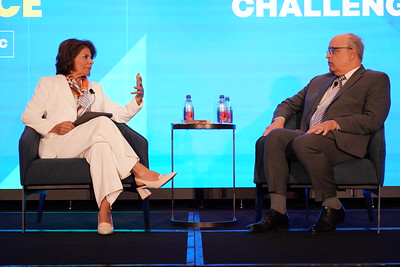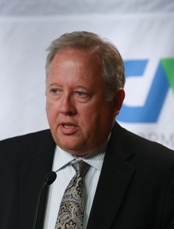Adios, Amigos
As Hillary Clinton travels through Latin America this week, the U.S. secretary of state will find it profoundly transformed from the relatively serene region she encountered as first lady in the 1990s.
At the 26th Annual CAF Conference from June 1-2, 2023, the Inter-American Dialogue, CAF-Development Bank of Latin America and the Caribbean, and the Organization of the American States convened President Laura Chinchilla, co-chair of the Inter-American Dialogue and former president of Costa Rica and Frank Mora, US ambassador to the Organization of American States, for a keynote dialogue titled “The Future of the Inter-American System – Old and New Challenges.” Chinchilla and Mora came together for a conversation on the future of the inter-American system, especially important in the face of the multiple challenges in Latin America and the Caribbean, including migration, insecurity, and democratic decline. The inter-American system – including the OAS but also the Inter-American Court of Human Rights and the Inter-American Commission on Human Rights and eventually the Inter-American Democratic Charter – has been built upon over the last 70 years, but it has become outdated and seems to be always trying to catch up to present-day issues, Chinchilla said.
When asked about how the inter-American system is responding to these challenges, Mora said he thinks about the OAS as two organizations in one. The first is the Permanent Council, which he acknowledged was fragmented, reflecting the broader polarization evident across the region. But the second is one that is often overlooked, Mora said, and that is the secretariats, which provide technical trainings, analysis, and support to both national and local governments across a range of topics, including democracy, citizen insecurity, and development. However, budgetary constraints have cut staff and limited the OAS’ capacity in this regard, especially because – by design – the organization was not created to respond to immediate crises. At the same time, Mora said, the region needs the OAS more than ever given current challenges, and political support and resources are necessary to help it function. Chinchilla wondered whether expecting such support is realistic at a time when some Latin American leaders publicly advocate for the disappearance of the OAS. To this Mora responded that there is indeed no consensus among member states, but that there are at least 25 members that agree on the importance of strengthening the OAS. He emphasized that the work that the OAS does is not easily replaced by other initiatives such as the CELAC in terms of its impact and its commitment to democracy. This is especially important given the attacks on democracy that the region has been experiencing in recent years, Mora added.
Chinchilla agreed that democracy is one of the most concerning challenges facing LAC at this time. Citizens are favoring governments that solve problems despite the erosion of democratic institutions, a decrease in political pluralism, and attacks against freedom of the press, she said. She added that the that the OAS was not designed to respond to this new type of gradual democratic decline in which elected leaders dismantle institutions while enjoying widespread support. Mora stressed that the OAS has the capacity and the responsibility to respond to democratic crises, but for this, the Permanent Council and the Democratic Charter must be upgraded to ensure the organization is ready to respond before the crisis explodes. New mechanisms are necessary to respond to slow anti-democratic processes rather than a single moment of a crisis.
Chinchilla pointed out that preparing ex ante is the largest challenge for the inter-American system and asked Mora what kinds of mechanisms could help facilitate preventative interventions without relying on the willingness of the very governments that are eroding democracy to allow for such work to happen. Mora responded that two possibilities would be creating an evaluation framework for democracy as well as creating the position for an ombudsman to consistently monitor warnings of democratic decline in the region. However, Mora added, the OAS does not have the capacity to sanction. This is limiting, for example, in the case of Nicaragua – despite there being a broad consensus among member states, there is nothing more the OAS can do to address the attack on democracy in the Central American nation beyond calling attention to the issue, Mora said.
In that sense, Chinchilla suggested perhaps it is time to think about a larger role for actors beyond the executive branch – including the judicial branch and civil society – in these processes and specifically in invoking the Democratic Charter. Mora said civil society indeed participates in the OAS and that there are ongoing discussions on how the organization can work with national and local governments to offer systemic programs that teach democratic values, especially among the youth, which surveys show are the most disenchanted with democracy. Chinchilla closed the session by acknowledging the youth’s demands for increased pathways to democratic participation and calling on the inter-American system to rise to the challenge of incorporating fresh and innovative ideas to address the region’s most pressing problems.
As Hillary Clinton travels through Latin America this week, the U.S. secretary of state will find it profoundly transformed from the relatively serene region she encountered as first lady in the 1990s.
During last month’s Rio Group summit in Mexico, Latin American leaders agreed to form a new regional bloc that would exclude the United States and Canada. Is this new group needed?
The Inter-American Democratic Charter is a watershed in how the region understands democracy.
 CAF - Development Bank
CAF - Development Bank
